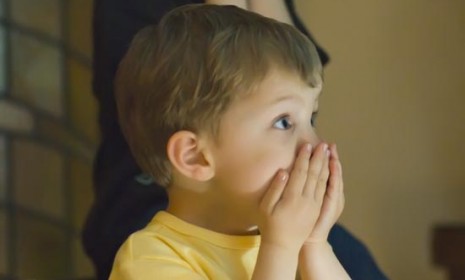How TV lowers self-esteem in kids... except for white boys
White boys are inspired by the glamorous lifestyles of white men on TV, researchers say, while girls and black boys are saddened by the characters they look like

TV may or may not rot kids' brains, as many worried parents warn. But it does, apparently, erode many youngsters' self-worth. According to a new study published in the journal Communications Research, watching TV damages the self-esteem of young girls and black boys — but actually boosts the self-esteem of young white boys. What accounts for the difference? Here's what you should know:
How was this study conducted?
Researchers from Indiana University and the University of Michigan surveyed about 400 pre-adolescent students — evenly divided between white and black subjects — over the course of a year. The students were asked to tally how much TV they watched, and then complete an 11-item questionnaire designed to measure feelings of self-worth.
The Week
Escape your echo chamber. Get the facts behind the news, plus analysis from multiple perspectives.

Sign up for The Week's Free Newsletters
From our morning news briefing to a weekly Good News Newsletter, get the best of The Week delivered directly to your inbox.
From our morning news briefing to a weekly Good News Newsletter, get the best of The Week delivered directly to your inbox.
What did researchers find?
After controlling for age, body image, and baseline self-esteem, the study found that exposure to more TV led to a decline in self-esteem among both white and black girls and black boys, but actually led to an increase in self-esteem among white boys. The study also found that the sheer amount of time children spend in front of the TV (seven hours a day, according to ABC News) is harmful to all kids, at least in some ways. "They're not given a chance to explore other things they're good at," says Nicole Martins, one of the study's authors.
Why does TV only boost self-esteem for white boys?
Children who spend almost all their free time watching TV "cannot help but compare themselves to what they see on screen," says Kristen Harrison, who co-authored the study. And typically, the lifestyle of white male TV characters reflects a desirable future for impressionable white boys: "You tend to be in positions of power, you have prestigious occupations, high education, glamorous houses, a beautiful wife, with very little portrayals of how hard you worked to get there." Female characters, however, are frequently one-dimensional and sexualized, while male black characters are often portrayed as hoodlums — sending the message "that there are not lots of good things you can aspire to."
A free daily email with the biggest news stories of the day – and the best features from TheWeek.com
What can be done?
There are several obvious solutions, says Cassie Murdoch at Jezebel: "Throwing the TV out the window," for one, or "reshaping the entire television industry so that it represents everyone." But short of such revolutionary changes, limiting TV time and diversifying kids' recreational activities is a good start. "Too much time in front of the screen may displace real-life experiences," says Martins. Something as simple as playing ball occasionally in the backyard could do wonders to "build a child's feeling of self-worth."
Sources: ABC News, Eureka, Jezebel, Imperfect Parent
-
 ‘Implementing strengthened provisions help advance aviation safety’
‘Implementing strengthened provisions help advance aviation safety’Instant Opinion Opinion, comment and editorials of the day
-
 How Manchesterism could change the UK
How Manchesterism could change the UKThe Explainer The idea involves shifting a centralized government to more local powers
-
 Church of England instates first woman leader
Church of England instates first woman leaderSpeed Read Sarah Mullally became the 106th Archbishop of Canterbury